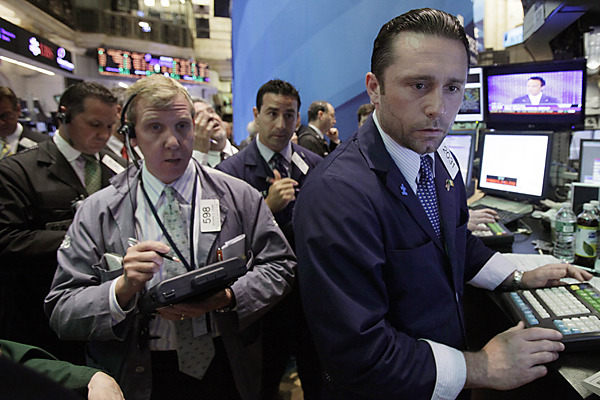On Monday, Office Depot Inc (NASDAQ:ODP)’s shares declined -1.25% to $7.90.
Office Depot, Inc. (ODP), a leading global provider of office products, services, and solutions, and parent company of Office Depot and OfficeMax, recently was recognized for its outstanding product quality and service by David Weekley Homes, the nation’s largest privately held home builder. This marks the tenth successive year that Office Depot has received the esteemed “A,A Partners of Choice” award given this year to only 15 of the home builder’s suppliers.
Office Depot, Inc., together with its auxiliaries, supplies office products and services. The companys North American Retail division sells an assortment of merchandise, counting office supplies, technology products and solutions, business machines and related supplies, facilities products, and office furniture under various brands through its chain of office supply stores. Its North American Business Solutions division sells branded office supplies, technology products, cleaning and breakroom supplies, office furniture, and other solutions, in addition to copy and print services to small, medium, and large-sized businesses through a sales force, catalogs, telesales, and Internet sites.
Murphy Oil Corporation (NYSE:MUR)’s shares dropped -1.95% to $32.15.
Murphy Oil Corporation (MUR) declared recently a net loss of $73.8 million ($0.42 per diluted share) in the 2015 second quarter, down from net income of $129.4 million ($0.72 per diluted share) in the second quarter a year ago. The net loss from ongoing operations in the 2015 second quarter was $89.0 million ($0.51 per diluted share) contrast to a profit of $142.7 million ($0.79 per diluted share) earned in the second quarter a year ago.
Adjusted earnings (loss), which excludes both the results of suspended operations and certain other items that affect comparability of results between periods, in the second quarter of 2015 showed a loss of $83.1 million ($0.48 per diluted share). This was a decrease of $244.8 million ($1.38 per diluted share) contrast to the preceding year`s quarter primarily attributed to significantly lower realized sales prices in the current quarter contrast to a year ago.
At the end of Monday s trade, Occidental Petroleum Corporation (NYSE:OXY)‘s shares dipped -1.14% to $69.40.
Occidental Petroleum Corporation (OXY) declared core income for the second quarter of 2015 of $165 million ($0.21 per diluted share), contrast with $31 million ($0.04 per diluted share) for the first quarter of 2015 and $1.1 billion ($1.38 per diluted share) for the second quarter of 2014. The second quarter of 2015 had stated income of $176 million ($0.23 per diluted share), contrast with a stated loss of $218 million ($0.28 per diluted share) for the first quarter of 2015 and stated income of $1.4 billion ($1.82 per diluted share) for the second quarter of 2014.
Operating cash flow before working capital changes for the first six months of 2015 was $2.6 billion. The six months working capital changes were $950 million. At December 31, 2014, accounts payable was $5.2 billion, and as of June 30, 2015, it reduced by $1.1 billion to $4.1 billion. This decrease was due to payments related to higher capital and operating spending accrued in the fourth quarter of 2014 but not paid until 2015. Total company capital expenditures for the first six months of 2015 were $3.2 billion. The Oil and Gas segment spent $2.7 billion, with Permian Resources representing 47 percent of the total expenditures, and the remaining $500 million was split between the Chemical and Midstream segments.
Occidental Petroleum Corporation engages in the acquisition, exploration, and development of oil and gas properties in the United States and internationally. The company operates in three segments: Oil and Gas; Chemical; and Midstream, Marketing and Other. The Oil and Gas segment explores for, develops, and produces oil and condensate, natural gas liquids (NGLs), and natural gas.
PepsiCo, Inc. (NYSE:PEP), ended its Monday’s trading session with 1.17% gain, and closed at $97.48.
Mountain Dew® and Doritos®, the ultimate fuel for gamers, are once again teaming up with Activision Publishing, Inc. for the latest installment in Call of Duty®, Black Ops III, which hits shelves worldwide on November 6. For the first time, the ‘Fuel Up for Battle’ program will offer fans exclusive Double XP in the highly-anticipated Call of Duty: Black Ops III Zombies mode, ‘Shadows of Evil.’
The Zombies mode in Black Ops III features its own XP progression system for fans – a first for the Call of Duty® franchise – adding greater depth and more re-playability to the Zombies gameplay that players have come to expect. Starting in early October, fans in the U.S. can collect codes from specially marked packages of DEW® and Doritos products to redeem points and earn up to 30 minutes of exclusive Zombies Double XP per day in addition to the chance to win other great prizes.
PepsiCo, Inc. operates as a food and beverage company worldwide. Its Frito-Lay North America segment offers Lay’s potato chips, Doritos tortilla chips, Cheetos cheese-flavored snacks, Tostitos tortilla chips, branded dips, Ruffles potato chips, Fritos corn chips, and Santitas tortilla chips. The company’s Quaker Foods North America segment provides Quaker oatmeal, grits, rice cakes, oat squares, and natural granola; and Aunt Jemima mixes and syrups, Quaker Chewy granola bars, Cap’n Crunch cereal, Life cereal, and Rice-A-Roni side dishes.
DISCLAIMER:
This article is published by www.wsnewspublishers.com. The Content included in this article is just for informational purposes only. All information used in this article is believed to be from reliable sources, but we make no representations or warranties of any kind, express or implied, about the completeness, accuracy, or reliability with respect to this article.
All visitors are advised to conduct their own independent research into individual stocks before making a purchase decision.
Information contained in this article contains forward-looking information within the meaning of Section 27A of the Securities Act of 1933 and Section 21E of the Securities Exchange Act of 1934, counting statements regarding the predictable continual growth of the market for the corporation’s products, the corporation’s ability to fund its capital requirement in the near term and in the long term; pricing pressures; etc.
Any statements that express or involve discussions with respect to predictions, expectations, beliefs, plans, projections, objectives, aims, assumptions, or future events or performance may be forward looking statements. Forward-looking statements are based on expectations, estimates, and projections at the time the statements are made that involve a number of risks and uncertainties which could cause actual results or events to differ materially from those presently anticipated. Forward looking statements may be identified through the use of such words as expects, will, anticipates, estimates, believes, or by statements indicating certain actions may, could, should might occur.



